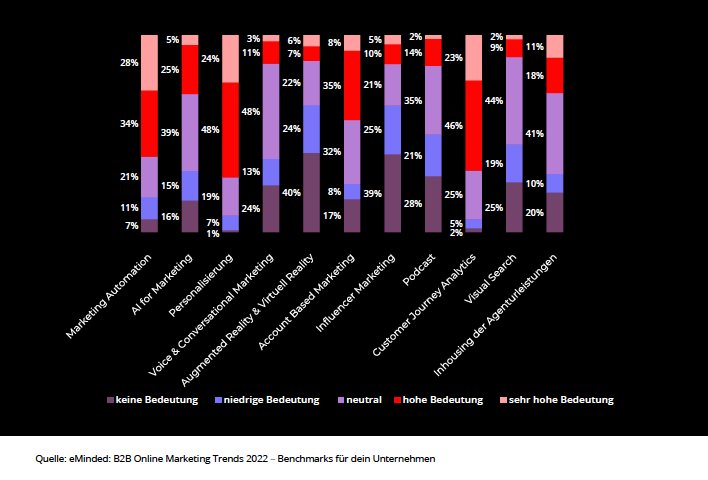Many companies - and the marketing teams that support them - are rapidly adopting smart technology solutions to drive operational efficiencies while improving the customer experience. These smart solutions often take the form of artificial intelligence (AI) marketing platforms.
Artificial intelligence is a fairly new technology and has only been available to marketers in the last decade. The majority of B2B marketers still do not use AI, but adoption is growing rapidly.
Through the power of artificial intelligence (AI), we are able to create more engaging and meaningful customer:ing experiences than we ever could before. But before we elaborate on this point and list the benefits of using artificial intelligence in marketing, you should first understand the basic principle - artificial intelligence is closely related to the Personalisation.
In this text, we explain why artificial intelligence should be treated with caution, in addition to its numerous advantages.
Why is AI used in marketing?
One of the biggest marketing trends, and one that is becoming more and more present every year, is personalisation. In marketing, it is a strategy that requires data collection. This data is an important basis for connecting with target groups and existing customers to provide them with an optimised marketing experience. By collecting and using data, companies and marketing agencies can identify patterns to target potential customers more effectively. Put more simply: Artificial intelligence is used in marketing primarily to personalise marketing strategies.

What is AI?
Artificial intelligence is the concept of letting machines "think like humans" - in other words, perform tasks such as reasoning, planning, learning and understanding language. Although nothing today or in the near future will match human intelligence, artificial intelligence still has a major impact on how we live our lives. The technology that enables AI is called machine learning, and there are many ways it can make our work easier and more productive. Now that we've covered the definition of Artificial Intelligence, let's talk about how it works and how you can use it to drive your business forward.
How does AI work?
We have already mentioned that collecting and using data about potential customers is the be-all and end-all of a personalisation strategy - and therefore also for your marketing success. Artificial intelligence does exactly that! It uses data and customer profiles to learn how best to communicate with customers and then delivers tailored messages to them at the right time - all without intervention from members of the marketing team to ensure maximum efficiency. For many of today's digital marketers, AI is used to augment marketing teams or perform more tactical tasks that require less human nuance. It provides the basis for another key marketing trend, namely Marketing automation.
Advantages of AI in marketing
Through its dynamic capabilities, artificial intelligence is enriching the B2B marketing landscape. Marketers can use AI technologies such as machine learning and algorithms to automate their marketing processes and bring more intelligence into their marketing strategies. This allows B2B marketers to optimise and personalise their customer experiences. Here are eight ways that artificial intelligence is opening up B2B marketing:
AI improves lead generation and scoring
Generating high-quality leads, followed by generating a high number of leads, are the two biggest challenges marketers face today. Part of the problem lies in the labour-intensity of data collection, management and analysis. To solve this problem, data collection and analysis can be automated by integrating AI into lead generation processes. This in turn increases the quantity and quality of leads generated.
Artificial intelligence can dig deep into sales funnels to capture highly accurate, dynamic data in real time across channels and databases that may be inaccessible or overlooked by marketers. Armed with this increased visibility and data accuracy, marketers can identify more leads, create differentiated targets and implement more comprehensive lead scoring systems.
AI creates better customer insights
For businesses aiming to deliver personalised targeting from the first second a customer or client enters the sales funnel, creating accurate Buyer Personas and ideal customer:inside profiles (ICP) is of crucial importance.
Combined with AI, social listening and analytics tools can help businesses achieve these goals. For example, you can gain insights into the pain points and identify the buying behaviour of your customers. This can be used to strengthen buyer personas and create tailored offers.
With detailed buyer personas, companies are able to address potential and existing customers with the right content at the right time.
AI personalises B2B marketing
AI-controlled B2B marketing simplifies the process by helping companies gain insights into buyer:inside behaviour and create accurate buyer:inside personas. This information can be used to curate hyper-targeted marketing material such as landing pages, blog content, emails, digital ads, etc.
From there, B2B marketers have the ability to initiate timely, personalised conversations with customers, address their pain points and anticipate their needs. Even better, these conversations can be scaled with artificial intelligence through marketing automation.
AI improves the customer experience
At the consumer:inside level, artificial intelligence has proven particularly useful. Digital assistants like Alexa and Siri paved the way for voice-based technologies. Now, consumers are not only using voice search to browse the internet, they are also making purchases this way.
Digital AI assistants are continually learning and becoming more intuitive to the speech patterns and browsing habits of their users to tailor search results to their users' preferences. Businesses can take advantage of this by optimising their website for voice search.
This not only makes their website more attractive to more potential customers, but also contributes to inclusive website design strategies that make websites more accessible to all.
Optimises website/app performance
How often do you examine your website's performance data to identify problems or areas for improvement?
Website analytics can be so complicated that interpreting them strategically on a consistent basis can be a gruelling task. AI-powered tools (like Google Analytics Intelligence) use machine intelligence to condense complex data into easily digestible and actionable insights.
One of the best things about AI in this regard is that marketers can be notified immediately of sudden or unwanted shifts in data. If a critical metric such as a website's bounce rate or the percentage of people leaving your website after a session suddenly increases, AI tools send real-time alerts along with all other relevant data.
AI simplifies SEO
AI-powered SEO tools not only save you time by finding relevant keywords. They can also keep you fully informed about new content by identifying trending topics, making keyword predictions and uncovering competitive gaps for predictive targeting. They can also optimise old content for SERP by performing dynamic keyword and link updates. Basically, Artificial Intelligence keeps your old content fresh and your new content up to date.
Increases customer loyalty
So your content is optimised and ready to be published, but if you post it at the wrong time, all that effort could be for nothing. This is where Artificial Intelligence comes back into play and promotes maximum customer:ing engagement by ensuring that content is posted at exactly the right time.
Improves customer service and customer relations
Maintaining positive customer relationships through quality customer service is the top priority. But how do you deliver personalised omnichannel customer service to hundreds of accounts in your sales funnel?
Customer:inside service automation is the leading application of AI for businesses today. AI applications such as chatbots and interactive voice response (IVR) systems exist both pre- and post-sale at customer:inside service touchpoints, able to perform transaction requests, order tracking, account updates and more.
By letting artificial intelligence take over the simpler tasks, agents can focus on customer enquiries and services that require more problem solving and empathy. As a result, these customers receive a more attentive service that goes a long way towards fostering positive customer experiences.
Disadvantages of AI in marketing
Artificial intelligence can have a transformative effect on your marketing, making campaigns more personalised, productive and predictive. But along with the many benefits, the technology also comes with very real drawbacks and limitations. We have listed the eight biggest challenges for you to overcome before integrating Artificial Intelligence into your marketing processes.
Access to high quality data
Data is the foundation for machine learning (ML). One of the challenges in ML is to ensure accurate information and results. Be it ML or AI, both rely on data to understand algorithms that have been run. For AI initiatives to succeed, access to meaningful and clear data that can help solve the problem at hand is essential. But the data provided by companies is typically noisy, unstructured, biased and full of errors. Moreover, many companies have neither a data infrastructure nor enough high-quality data.
To overcome the challenge of accessing high-quality data, a company must have master data preparation tools that can be used for formatting, data cleansing and certain standardisations. If a company overlooks the importance of high-quality data, the AI or ML project can easily be derailed.
Balancing accuracy
The balance between model interpretability and predictive accuracy can only be achieved by selecting the appropriate modelling approach. While higher accuracy needs hard-to-interpret data and complex models, the easy interpretation use simpler models that can compromise accuracy. Instead of the traditional Black box technologywhich only minimal insights are generated, the AI team today uses White-box models (WBM). WBMs provide clear explanations of how they generate predictions, how they behave and which variables are affected by the model. If you are still using the black box model, this can lead to trust issues with clients as transparency is reduced. So using WBM can save you from weighing up accuracy and build trust at the same time.
Identifying problems for companies
Artificial intelligence is an amazing and powerful tool, but it cannot solve every business problem. If you want to introduce it into your business processes without a target, just because many companies do, this path is doomed to failure. Artificial intelligence is incredible when it comes to discovering customer:inside patterns, gaining insights and sifting through huge amounts of data.
To be successful, you need to prioritise complex and hard-to-solve problems with clear goals. Then you can define the success criteria and measure them with relevant metrics.
Complexity
The core problem a company or marketing agency encounters is the time it takes to develop and deploy machine learning solutions. When data is scattered in different formats in the database, you need to merge all the data from the disconnected systems. Here comes the biggest challenge: cleaning, extracting and reformatting data. And once you've done that, the next challenge is to manipulate data specific to ML or AI pipelines.
The easiest way to solve this problem is to use automated machine learning tools such as AutoML 2.0that eliminate the complexity of the data pipeline.
Less support
As the visibility of AI implementations in the market is very low, there are accordingly few companies interested in investing their money in developing products based on machine learning and artificial intelligence.
Moreover, there are not many people out there who can make them understand the power of machine learning and its progress in today's world. So only a few knowledgeable people exist with the knowledge of how to operate the machines that can learn and think for themselves.
Resource investment
Decision-makers:inside are always concerned about the cost and execution required for AI apps. Well, the best starting point for AI is not to ask for more financial resources and budget. Instead, you need to consider the capabilities of the marketing tools you use for AI. Some of the platforms on which AI systems are used are HubSpot, advertising tools in Google Adwords and CRMs such as Salesforce. AI innovations are not based on channel, but on cases. For anyone who ran a search engine on their website, an AI algorithm would be best suited to personalise notifications, newsletters, emails as well as chatbot content.
Inadequate IT infrastructure
Another challenge in developing powerful and effective AI/ML solutions is the IT framework. With the huge amount of information generated using AI technologies, high performance hardware is required. Running the systems required for AI or ML solutions can be very expensive. Likewise, there is a need for frequent updates and maintenance. For smaller companies and agencies with minimal budgets, this can become a critical obstacle.
Conclusion
Comparing the pros and cons of artificial intelligence in marketing can seem overwhelming at first glance. Artificial intelligence has many advantages and can drive your business or marketing agency forward, but it does have some potential disadvantages. Don't rush into AI integration just because it's a 'hot' topic at the moment. Instead, weigh up your company's own advantages and disadvantages of using AI in your marketing and seek expert advice.






